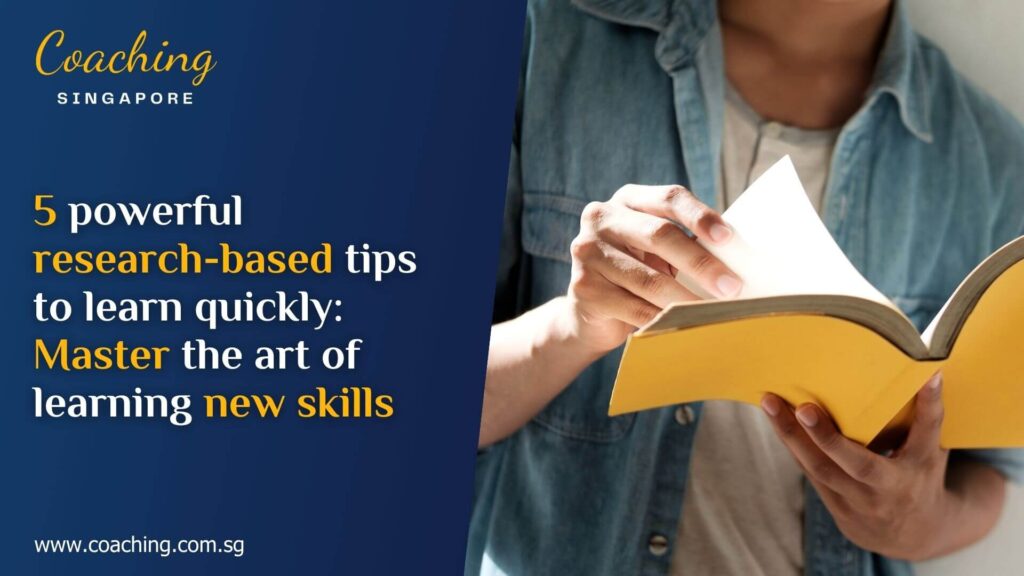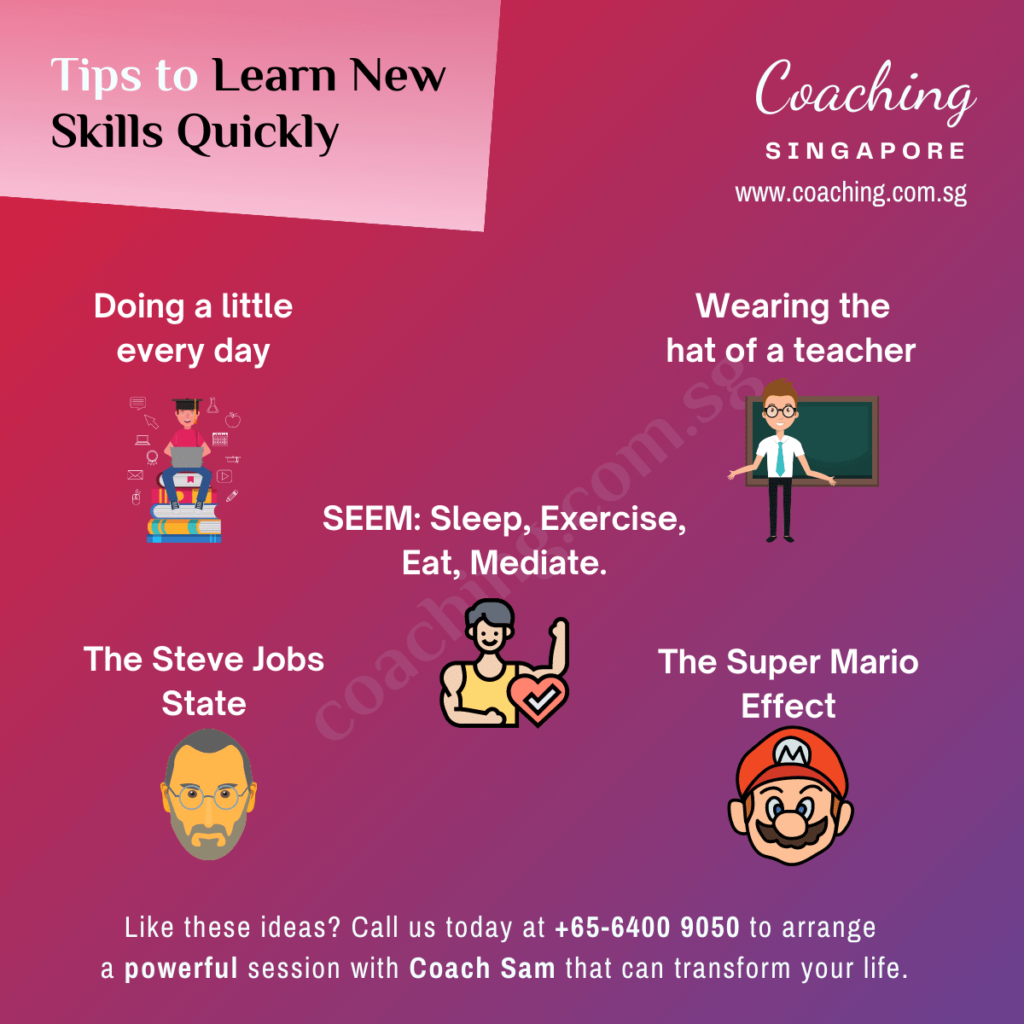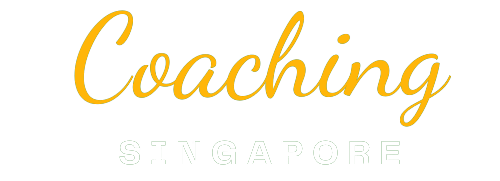Home » Mental Resilience » 5 powerful research-based tips to learn quickly – Master the art of gaining new skills
5 powerful research-based tips to learn quickly - Master the art of gaining new skills

- Author: Coach Sam
Learn continually – there’s always “one more thing” to learn! – Steve Jobs
To grow as a human being is to learn new things – skills and ideas.
And, by extension, it is a prerequisite for meaningful and sustainable success.
Coupled with that, we have only a finite amount of time – in a day, and in productive years.
That makes the ability to master new things efficiently one of the best qualities a person can have.
There are 2 reasons that I can share that underpin the notion of absorbing know-how quickly is probably the most valuable mental skill that you can develop.
Reason #1 – We all have a natural constraint in our lives, which is time. And how well are you able to optimize that time will define the trajectory for your life.
So it is crucial to increase the pace of your learning, optimize your processes & reduce the duration of your learning curve.
It will enable you to get more stuff done in less time, build specific knowledge in your domain & become a high-worth individual.
Reason #2 – Constant change
With all the technological advancements that are happening in many disciplines, it is very evident that only those who will be able to succeed who possess the skill to learn anything with speed & reinvent themselves.
The knowledge & skills that you may have now can be obsolete in a few years.
The only way for you to still thrive in your career is to master the art of learning.
Where I started on this journey
When I was young, I had struggled to learn things quickly & to retain what I had learned.
Have you ever been there where conquering complex skills of your domain seem to be daunting tasks?
Well, I definitely have.
I always used to shy away from learning them or used to quit very easily.
Though that was hampering my professional life.
I was just unable to upscale myself & didn’t feel motivated to go to the next level.
Until one day when I decided that I am going to understand the fundamentals of how a human brain learns & retains what it has learned.
I dug deep in tackling this problem & read whatever there is to read in order to master the art of learning – from neuroscience, diet, environment & all the other factors that come into play for one to internalize anything quickly & effectively.
The tried and tested tips & techniques that I am sharing with you today have done wonders for me, and trust they will work for you too.
Here is a breakdown of the tips that we will be covering in this blog:
- If mastery is the lock, repetition is the key
- Wear the hat of a teacher
- The Steve Job's Syndrome
- The Super Mario Effect
- SEEM Right
All the above tips are actionable nuggets that you can apply right after reading this blog.
So without wasting any of your time, let’s get to it!
Tip #1 - If mastery is the lock, repetition is the key ( Doing a little every day )
“Repetition is the mother of learning, the father of action, which makes it the architect of accomplishment.” – Zig Ziglar.
Think back to when you learned to ride a bike, drive a car, or play a new sport.
First, you need to learn the essential skills.
Then it was all about practice and more practice until you gained confidence, improved your speed, and became skilled.
Repetition helps to improve speed, increases confidence, and strengthens the connections in the brain that helps you to master any skill or anything that you are trying to learn.
This is the way our brains are wired; the more we do something, the more important it becomes, and the more entrenched it becomes in our memory.
Action Step:
Pick up any one skill that you want to learn.
Block some time in your calendar for a dedication session in which you will practice what you are trying to learn.
Do this on a consistent basis and you are bound to see results.
The trick is to stick with it long enough until it becomes your second nature.
What do I mean by “a little”?
“A little” is what is sufficient progress for the day, and yet not so much that we become jaded, fed up, or sore doing it.
The key is not to do too much on any particular day or period.
The aim is to do just enough to keep it enjoyable and sustainable – such that you are happy to come back and move forward the next day.
Tip #2 - Wear the hat of a teacher
If you imagine that you’ll need to teach someone else the material or task you are trying to grasp, you can speed up your learning and remember more, according to a study done at Washington University in St. Louis.
(Link to the study: http://www.ncbi.nlm.nih.gov/pubmed/24845756)
Wearing the hat of a teacher forces you to reword your innate knowledge, and revisit it from the ground up.
It’s a perfect test to see if you’ve truly internalized something — or if you’ve just been going through the motions of learning.
The act of teaching also helps improve knowledge.
Ask anyone who has trained someone else whether they also benefited from the experience.
They will always say yes.
Action Step:
Teach someone a difficult skill or a concept that you have recently learned.
This act alone will benefit you in two major ways:-
1) It will give you a reality check. You would immediately know how thorough and in-depth is your knowledge of the concerned subject or skill.
2) Teaching requires you to think about what you have learned with a whole new lens.
It will inevitably deepen your understanding & will enable you to gain mastery over what you have learned.
Tip #3 - The Steve Job’s Syndrome ( Focus on learning 1 thing at a time )
Simply put, this is focussing on learning just 1 thing at a time.
We all know that Steve Jobs was famous for a lot of his unbelievable achievements.
Though he had one remarkable quality which personally inspires me to date and that is “Focus”.
That’s why I coined the term “Steve Jobs State” to exemplify the immense power of focus.
However, there is enough evidence & research that shows how multitasking hampers your productivity & reduces your efficiency in learning.
In order to truly learn something quickly & effectively, you need to put yourself in a distraction-free zone.
Action step:
Block half an hour in your schedule every day to learn any relevant new thing, consistently.
And when you begin learning, deploy deep focus & say no to everything else.
Don’t let the simplicity of this concept make you think that it’s not that effective.
Having remarkable focus is just like building a skill for the mind. Build this mental skill by setting aside short sessions of distraction-free learning.
You will be amazed at the things you are able to learn in record time.

Tip #4 - The Super Mario Effect ( Find ways to make it interesting )
This is finding ways to make your learning interesting.
Examples of this include games, quizzes, and any other creative activity that has a way of scoring ourselves and/or competition with someone else.
Not all games are meant to aid learning, but many subjects can be learned quickly and in a fun way by playing the right games.
This includes a new language, a skill vital for your professional progress, and abilities that enrich you personally.
Mastering new techniques is a challenge, but it doesn’t have to be boring!
When the approach to learning is focused on fun, the process can actually be very pleasant.
And we learn as a side-effect, many times without even realizing it.
Games are far from those repetitive and tedious methods, based on pure data memorization, which leads to a lack of progress and very poor learning.
Use your creativity to make things joyous for you, maybe put on some relaxing music in the background, learn a skill with your friend, participate in learning hackathons & competitions.
Keep on experimenting & eventually you will find ways of making learning a fun task to do.
There is a great TED talk on this topic that I would encourage you to watch in case you are interested.
Link to TED talk: https://www.youtube.com/watch?v=9vJRopau0g0
Tip #5 - SEEM ( Sleep, Eat, Exercise, Mediate ) Right
All of the points below are an absolute no-brainer & will definitely help you in learning quickly & to retain what you have learned too.
Sleep:
Researchers found that sleep deprivation can affect your ability to commit new information to memory and consolidate any short-term memories you have made.
Source: http://www.ncbi.nlm.nih.gov/pubmed/17293859
Bottom line? Sleep enough to be at your best.
Excersie:
Many studies show that regular exercise can improve memory recall.
Source: http://www.ncbi.nlm.nih.gov/pubmed/10913684
Another study from McMaster University found that periods of high-intensity exercise are good for fitness and memory.
Source: https://www.sciencedaily.com/releases/2017/11/171122103555.htm
Exercise results in significant improvements in high-interference memory.
Interference occurs when information that is similar gets in the way of the information you’re trying to recall.
A commonly used example for high-interference memory is remembering faces, a skill that is especially useful for people hoping to make connections.
Exercise also results in an increase in a chemical called BDNF (brain-derived neurotrophic factor), a protein that supports the function, growth, and survival of brain cells.
Not only will you feel better if you exercise, but you’ll also improve your memory.
It is a win-win situation.
Eat:
By eat, I mean consuming the food that makes you fit, young & boosts your brainpower.
There are several studies about what one should eat or avoid when it comes to improving your overall health & boosting your memory.
Source: https://www.frontiersin.org/research-topics/4414/impact-of-diet-on-learning-memory-and-cognition
The knowledge is in abundance, it is the willingness to eat what is right for you which is scarce.
Good practices are:
- to avoid processed food and drinks
- limit sugar intake
- have a variety of fresh fruit, vegetables, and nuts
- consume calories only during a set period, between 2 to 10 hours, every day
- drink plenty of water during the fasting hours
Simply put – The decision to commit yourself to a healthy & balanced diet is in your hands.
I trust you will make the right choices.
Meditation:
Among the countless benefits of meditation out there, let’s focus on the one which helps in learning.
Scientists have found that meditation stimulates areas of the brain which are pivotal for learning; in particular the hippocampus and the frontal lobe.
These areas are highly active during the learning process and while meditating.
Meditation activates and strengthens these brain regions, which leads to an improved capacity to memorize, store and recall information.
There are some more amazing benefits of meditation and I have a blog on that too.
In case you are interested, click here for my article on the Benefits of Meditation.
In short, I highly recommend you to build a habit of meditating daily.
Once you see the results and how it changes your day to day life, you will never go back.
Conclusion:
Learning new things while maintaining your role as a leader, visionary and committed worker can be testing, however, it’s not that difficult as it may seem to be.
With these tips/hacks, you’ll have the ability to learn quicker and more effectively than ever before.
Comment: Is there any tip/hack that you have personally used in order to learn things quickly which has not been covered in this blog?
Let me know in the comment section below, I would love to hear your stories.
Share This Post, Choose Your Platform!
